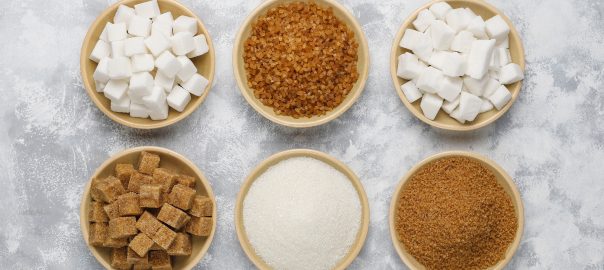
Head-to-Head Comparison Of Sweeteners
Sugar is one of the biggest sources of carbohydrates in the typical North American diet, and comes in all types of forms, including sweet drinks, candy, baked goods, condiments, and more. When looking at ways to keep the sweetness in your life without the problem of high carb counts, it can be tricky to navigate through all the artificial sweetener options available. Let’s compare and contrast the most popular low carb sweeteners.
One of the first things that low carb and keto dieters learn when starting out is how ridiculously widespread the use of sugar is in the food and drink industry. Simply take a few minutes to peruse the nutrition labels on the shelf of any grocery store aisle, and you’ll see what we mean. Fortunately, there are plenty of alternatives to choose from that are low-sugar, or entirely sugar-free, made using a variety of different artificial sweeteners.
However, with so many choices available, it’s important to know what to look for in a sugar alternative, especially since each one will have a different taste profile and measuring ratio. This means that when you’re cooking and baking, you can’t always just swap out natural sugar for an artificial sweetener in the exact same way. Some artificial sweeteners are more concentrated, so you won’t need as much to get the same level of sweetness in your recipes. Let’s take a quick look at the biggest differences between artificial sweeteners and normal sugars.
How Are Artificial Sweeteners Different From Normal Sugar?
The first thing to know about sugar alternatives is how they are made. Normal sugars include those refined from naturally-occurring sources such as sugarcane, sugar beets, honey, and corn in the case of high-fructose corn syrup. The technical name for these types of sugars include glucose, fructose, and sucrose, which is what you’ll see listed on the ingredient list on many typical grocery products. These are the sugars that are defined as carbohydrates.
Alternative sweeteners and sugar substitutes can be made either from natural plant-based ingredients, or manufactured artificially. These are often referred to as ‘non-nutritive’ sweeteners, as they generally have no calories, nutrients, or carbs. Some artificial sweeteners are made up of sugar alcohols, which is a molecule that has similar taste properties to normal sugar, but is not metabolized by the body in the same way. Because of this, sugar alcohols do not get counted as carbs like regular sugars do. The common names of some of the most popular sugar alcohols used in artificial sweeteners include xylitol and erythritol.
In addition to sugar alcohols, some alternatives to sugar are made entirely from plant extracts. The most common of these include brand names such as Stevia, which is produced from the leaves of a South American plant called Stevia rebaudiana, and Monk Fruit, which is extracted from monk fruit plants found in some parts of Asia. These extracts are non-nutritive, zero-calorie, and zero-carb, thereby having no effect on the nutritional value of the products that contain them.
Measuring Alternative Sweeteners In Place Of Sugar For Cooking & Baking
Artificial sweeteners are often more concentrated in ‘sweetness’ than normal sugar, which means you need far less of it to achieve the taste that you’re looking for. For example, Stevia is a very concentrated sweetener substitute, with a single teaspoon of powdered Stevia equating to the sweetening power of a full cup of sugar. When preparing food using these types of artificial sugars, it can be helpful to have a conversion chart handy to make your measuring easier and more accurate. Most manufacturers of these sweeteners will have conversion charts available on their websites, such as this Stevia and monk fruit conversion reference from SweetLeaf.
On the other hand, some sweetener alternatives are manufactured to be identical to normal sugar in terms of sweetness gram-for-gram, making it easier to cook and bake with them since there’s no conversion required. You can simply swap them in and use the exact same measurements without missing a beat. An example is Lakanto Sweetener, which is a blend of monk fruit and erythritol that is precisely made to have the exact same sweetness level as normal refined white sugar. One cup of Lakanto is the equivalent in sweetness to one cup of refined white sugar.
Be sure to check the sweetness conversion of a particular sweetener before you buy, as your preference may differ based on how you intend to use it, such as if you’re going to use it for cooking and baking, or simply want a sugar-free option for sweetening coffee and other beverages, for example.
The Most Popular Low Carb & Keto Sweeteners
Stevia – Currently one of the most high-profile sweeteners for low carb and keto dieters, Stevia is a naturally-derived sugar alternative that can be found in a very diverse range of products, such as soft drinks like Zevia, baked goods, and candies such as SmartSweets, as well as in powdered and liquid forms to be used in cooking and baking. Stevia is a very concentrated sweetener, and so you typically need very little of it to achieve the taste you’re looking for. Just a couple of drops of liquid Stevia is often enough to do the job for morning coffee, and small portions of powdered Stevia is needed when replacing large amounts of sugar in baking recipes.
Sucralose – Sucralose, also known by the brand name of Splenda, is an extremely common artificial sweetener used in the manufacture of all types of sweetened food products, including popular varieties of flavoured sugar-free coffee creamers. Sucralose is actually made from natural sugar and refined using a unique process that alters the molecular properties to produce a highly concentrated sweetener. Although Splenda does contain very small amounts of calories and carbs, the concentrated sweetness means that such a little amount is needed that the effects are essentially negligible for low carb and keto diets.
Monk Fruit – Sweeteners made from monk fruit have surged in popularity in recent years, and are manufactured by many different brands, including Krisda, Lakanto, Dixie Diner, and NuNaturals, to name a few. Many producers of monk fruit sweetener choose to offer it in a format that measures in a perfect 1:1 ratio with natural sugar, making it easier to utilize it with all types of recipes without having to perform any measurement conversions. Monk fruit sweeteners have a reputation for having no lingering aftertaste, often making them the preferred sweeteners for people who want the closest taste to natural sugar.
Erythritol – One of the most popular sugar alcohol alternative sweeteners, erythritol is the ingredient used to make the popular sugar substitutes marketed under the brand name of Swerve. Swerve is a zero-calorie sweetener that is manufactured to measure in a 1:1 ratio to normal sugar, but also has the benefit of having a zero-glycemic index, meaning that it will not spike blood sugar, which is of particular importance to people with diabetes. Swerve has different properties than some other artificial sweeteners, as it is made to act with similar characteristics to real sugar, such as the ability to brown and caramelize for certain baking recipes, such as the always-delectable crème brulé dessert.
The Trick To Finding The Best Low Carb and Keto Sweetener
So, you may be wondering exactly which of these types of low carb sweeteners you would be better off keeping in your kitchen. The answer is, as it often is, ‘it depends’. Each brand of artificial sweetener will inevitably have a different taste profile, and this simply comes down to personal preference. Nobody can definitively tell you which is going to be the perfect sugar substitute for you until you actually taste it. Fortunately, sweeteners are an inexpensive product with multiple uses, so it’s quite common for people to test out a few different options to find out which one they truly prefer. For many people, it’s not unusual to have two or more choices of sweeteners in their cupboards to suit different situations, such as one for coffee and one for baking, for example.
To shop the entire selection of low carb sweeteners and keto-friendly sugar substitutes available here at The Low Carb Grocery, visit our Flavoured and Unflavoured Sweeteners category. Whether you’re looking to make some delicious low carb baked goods or add a shot of flavour to your sparkling water or morning coffee, you’ll find exactly the right sugar-free artificial sweeteners here.






